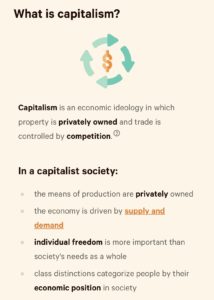Creative Entrepreneurship – Individualism Or Collectivism

I recently spoke with a good friend who is highly successful in his drop shipping business, and has been for over 20 years now.
This is someone who is in the area of Creative Entrepreneurship where he expresses his own ideas, earns well, and yet invests back into his community.
He spoke with me about how he felt he was making a difference by selling ethical quality products, and was able to live and spend money locally near where he worked at home.
So his home town benefits from him.
In simple terms, the guy sells globally, and doesn’t have to meet customers face to face, but he understands the opportunity he has and appreciates that whilst he sells in a somewhat lesser personal way, he re-invests into his own community.
So my belief is that there is nothing wrong with being an entrepreneur, or small business owner selling ethically wherever you wish to sell, and yet buying and supporting local.
Small business owner versus entrepreneur explained
As a general distinction – A Small business owner is considered a person or persons that tends to oversee an operation or established model, whereas an entrepreneur is considered a person or persons that will focus on high-growth and high-risk actions.
And some see small business owners as sole proprietors that are in a sense from a petite bourgeois leaning, meaning that they are more like artisans or self employed middle class types.
In other words; some believe that small business owners aspire to be rising up the system, but there is a difference generally between the two in the sense of capitalism.
The entrepreneur tends to adore the opportunity to be always expanding and growing somewhat aggressively, and to be rich, but the shop keeper loves to provide a local service and be rewarded accordingly to live a comfortable life.
I know that some people are kind of in-between this, and so capitalism can be a little blurred, but there are those that are concerned that they don’t do enough for their community locally, and feel they are capitalists.
So these types may worry about the state of capitalism, and being a part of it.
I am here to dispel the myth that you cannot be a capitalist and care.
You can care, and still create a healthy growing innovation, business, or whatever you wish to call it.
And that is exactly what I talk about here.
Understanding what this means is useful because we may wish to work creatively and build a solid brand or global name and still care about our respective communities.
And we may live and earn as individuals and still feel a part of it all, by contributing to it, and making a difference in supporting local businesses.
It matters to my pal to support his home town in the USA, just as it matters to me to support my home town in the UK.
This is why we may be individuals whilst also appreciating a kind of collective.
Putting money back into our local economies means we are buying locally where possible, which helps all around us.
And it is not uncommon today for many thousands of people to work from home as entrepreneurs, as today creatives have so many options available.
My heart will always be with the small business though, and here in Bristol I love to support my local shops and enterprises.
CLICK HERE TO READ 11 REASONS TO SUPPORT SMALL INDEPENDENT LOCAL BUSINESSES
Digital world
With the birth of online shopping and further advancements in business models and technology, it means many of us can build highly successful enterprises from home if we so choose to, but does this impact badly on the economy?
As long as ethical online entrepreneurs can source and deliver good quality and value through selling, and invest back into where they feel they can support their home then its not a bad thing.
It is bad when there is no consideration for the actions of doing business, and what impact that will have more widely.
So the question is; How might we enter the creative entrepreneurship arena today as individuals and expand ‘yet’ consciously contribute to a kind of collectivist culture where all may benefit?
First of all – is that even possible? And does that even matter to you?
If not then that is your choice of course, but it does to me.
Why?
Because whilst we may use our skills in lets say influencing, website building, content creation, podcasting, sharing our dances or faces for make up, expressing our style or just about anything else, as the world really is our oyster by applying our gifts and talents to something that many can connect with, we should (I believe) invest back into what gave us that opportunity to live and work in this way in the first place.
We should invest back in to what matters to us.
And imagine if more people in current areas of creative entrepreneurship considered investing back into the communities they live in.
What I would call Creative Entrepreneurship as an individual, and thinking of others such as small business owners at the same time.
And as you may already be aware of, we might require a team of others around us, or a small collective of sorts.
This is where we create some balance of individualism and collectivism and do great business.
We all know about communism and capitalism, and how these affect societal economies and fairness, and there are arguments for both, depending on who you ask, who you are, and what you believe in.
But if you don’t already know, here are explanations of each area, courtesy of learn.rumie.org:


At a quick glance Capitalism doesn’t necessarily look good in that light, but that is a generalized view.
Because I see nothing wrong with what I call conscious capitalism, whereby we do what we do ethically, with value and with an awareness of what impact we make.
And thankfully many young entrepreneurs these days are more driven towards a better world and greater fairness, so why couldn’t it work?
Why shouldn’t there be energetic, dynamic forces that create awesome ideas, products and services whilst doing so with others that share this idea or vision?
So being an individual and having individual rights of expression, is our right I believe, and it means we may be able to be enterprising, thus achieving both growth and progressiveness, and also paying into other small businesses in our local areas.
After all – ‘no man is an island’ some say, we are all connected in some way!
Mini collectivism?
This is possibly where we may utilize a sense of collectivism whereby we buy local, and thus invest into our economy, as we develop a solid team can help us create a vision, mission and movement.
This should also enable the creation of opportunities for others in our community to be a part of it, and/or to buy from us.
In essence we can serve the world or serve our community and society, yet we may still drive money back into our towns and cities.
All through expressing our individual passions.
My friend that I spoke about at the beginning of this post accumulates healthy wealth for himself and his family, and he serves others, but he also invests back into his local shops.
He also has a small team that he looks after and he sees them as a kind of family, and through this appreciation he draws out the best work, and shows his gratitude by supporting team members.
He also takes his team on trips, offers them rewards and has a healthy pay structure.
If what we do is fair, as he does, and if what we do supports our teams, our families, and our communities then we are providing worth and value and a purpose in our commitment.
This means we promote good ethics and integrity from ourselves and all in our sphere.
And through supporting local businesses also we help those to build their own small businesses.
As we invest in others and support creative entrepreneurship and small business owners, we are true leaders.
Something else my friend supports is less privileged kids, where he helps local kids in his community to become educated in creative entrepreneurship .
Simply; we may have the freedom to do what we want, as we also contribute to the whole.
This is what life can be like in the U.K. but not in all countries
I understand that there are those in some countries that have little choice about the roles they perform in, namely in some collectivist countries.
And yet there are many collective societies that can work very well this way, for the whole rather than as individuals.
Many within that familiar structure can feel satisfied being a part of an overall system whereby they put others first.
The reason for this post though is that I don’t necessarily believe in ‘not’ being free to express myself and my ideas, but I do believe in communities helping one another. So whilst it may work in some countries, I don’t feel that it is completely healthy.
Therefore – perhaps there is blend of the two that could work in some societies more so? 1) Enable freedom for expression individually if this is desired with 2) A collective care that creates co-existence in the community. Rather than moving apart from one another we connect alongside one another to lift the community and local economy.

Creative Entrepreneurship – Individualism Or Collectivism
What do you believe in and what do you stand for?
In the modern world of mass distraction, extremes and varied ethics, it can cause a lot of confusion about what direction one should move in, and whether or not it is for the sake of progress.
Increased far left growth and increased far right growth in the UK can drive division forward, and it can leave the UK in somewhat of a mess with regards to what direction to move in.
It can change business, behavior and balance within certain communities.
But certainly the majority of young emerging entrepreneurs I speak with see themselves as more ethically driven and conscious of doing business in progressive ways, and more than ever before there is a greater sense of collective progress.
Some of the UK population believe there should be greater collectivism, yet many embrace capitalism, and there are those that are somewhere in the middle. Those that have a blend of beliefs.
But where small business owners and operators are concerned, we all need to become aware of WHY we do what we do, and how we operate and what our impact is.
Simply put; this means knowing that we are planting the right seeds for the future of business and future generations.
But why? Because if we are ignorant to our place in society and abuse this we can become less relevant, so will suffer and even fail in some cases as individuals and business owners.
We determine what we represent and stand for, and we need to become aware of where we focus our intentions.
This includes 1) what we buy and where we buy it, and 2) what we sell and where we source it from.
That’s ‘if’ we have that luxury and freedom to express what we believe in and act upon.
So those working in all forms of small business and creative entrepreneurship should do so with responsibility.
Because as I stated earlier, if we fail to grasp this we will struggle through ignorance.
And as the economy is unstable enough, some businesses will become less and less relevant.
Understand what you do, who you do it with and for, how you do it, why you do it and also become aware of the impact it is making.
For example; A small independent business where I buy my shirts from create those shirts quite locally, using materials that are locally sourced, and with a team that all help each other to perform at their best, they have a strong brand. The owner (a good friend of mine) of this business cares about his brand, team, customers, and about his impact on his community. He invests back into his community by offering jobs to locals and supports charities and foundations that help his community to have sufficient funding for important projects.
He also helps other local small business owners with tools and resources to grow where he can, and these businesses also recommend his products.
See how that works? In a high street scenario for example if all businesses supported each other in this way, more would survive the trials and tests of business challenges. Through connection and collaboration.
If we can deliver quality products and services, and invest back into our communities we can play our part in shaping a healthy future for all.
Through operating in this way it means we don’t need the big capital corporations to dominate us all. Wouldn’t that be nice?
We may be able to develop the right high streets, communities and entrepreneurs, through building solid foundations with loyal customers and partners that are aligned.
And do so whilst sourcing from surrounding businesses.
This may enable us to become greater local assets.
And through being individual small business operators, team players, collaborative partners, whilst supporting our communities, we are building in less risk.
We may operate in positive productive ways everyday, and operate in ways that impact all for the better.
Through being more conscious, we can stand by our values, beliefs, and morals in ways where we deliver our best work.
And if we are local, we can do so through the using right channels that are welcomed and appreciated.
The beauty of this is that we can gain support from the right investors, friends and partners.
The small business owner operator
Today is very tough for the small business owner in the U.K. and in many other countries, and in the often unstable times we find ourselves in, it can be very stressful to survive and turn a profit.
Some business owners wish to form solid exit strategies and others are desperate to borrow to stay afloat.
This of course means it can be overwhelming and uncertain, especially in that first year, and as we all need to make a living, we have to aim to become the monopoly in what we do, to stick around.
It is not just about accounting, selling, KPI’s, other metrics, branding, data and marketing, and all the other nuts and bolts of running a business, it is about the focus of the value given to other human beings around us.
This means leading with care and attention and being ahead of the curve.
Conscious Operation
This is why increasing awareness around all aspects of business matters. With customer service and relationships, culture, team development, partners, growth and sustainability, equality for all, sourcing of goods and supply chains, human rights, and so on – all of it matters.
Truly leading in our roles and cementing our place in the future picture of business requires a strong and flexible attitude.
Through doing this it leads us to also understand how to make the right moves and steps towards lasting success and generational progress.
And as the world moves fast, and systems, software and tech keeps advancing forward also, we must get to grips with ensuring we know how to use these tools in the best ways where required.
Just as those who operate these tools need to understand what to do with it very day.
Because today we are expected to master these systems and manage the processes to maximize complete and holistic performance.
SHARE Individualism Or Collectivism – Creative Entrepreneurship Share on X
Creative Entrepreneurship – Individualism Or Collectivism

We all know that Business can be a tough world to navigate.
And life can be – can’t it?
Of course, so in order to help us on our journey as we progress in this uncertain world, we should do something we believe in morally.
As we do something that matters, and as we add value and stay ahead of the curve to survive we can use the precious opportunities that we have been given responsibly.
But it is becoming increasingly tough for many, as we see on our own high streets, and many wonderful small businesses die out, so it is clear that the damage and loss of many long lasting retail establishments through the shifts in buying and human behavior is destroying many brands.
so there is simply no time to sit and bury our heads in the sand, hoping for some kind of divine miracle to save the day.
There are no guarantees, and always risks, and businesses can sadly become irrelevant, because it sometimes cannot be helped, but by becoming more aware of this, and doing what is necessary to survive, we might develop the best skills to sell and serve in better ways.
But still grow through knowing how to adjust and move with the changes.
So as you may know, individualism can feel both frightening and exciting, uncertain yet progressive, and what we attempt to do might be a huge leap into the unknown as no-one really knows what the future holds in such unstable times, but I can suggest that we learn to maximize our chances where possible, and do so correctly.
Self education
By being well read, logical, experienced and educated, whilst at the same time having the fire and passion to drive forward, we can trust our intuition more to get us to our goals, through applying the right focus required to work with the right products, partners, services and types, we can make it.
What this means is – we may be part of a kind of conscious collective capitalism and care.
Without that sounding too airy-fairy.
So then is capitalism really okay?
Many people have ideas about capitalism, and it seldom looks good when it comes to often reckless corporations, so it can drive extremism in different directions. And many simply hate corporations, but adore sharing ideas and believe in self expression.
And so many of us are still capitalists in one form or another.
I also believe that if ‘you or I’ have ideas to share then why shouldn’t they be expressed in some way – and in why not in ways that may even bring in wealth? As long as that wealth is ethically used.
When money becomes a bi-product of your great ideas then how is that bad?
It isn’t!
So I think it’s worth seeing how we may separate corporate capital greed in general terms from those with great ideas, or those with small business models who ‘may’ wish to expand and do something worthy.
Whilst the 1% can often overlook many parts of society, humanity and nature, you and I are able to still grow great businesses and still exist with some semblance of balance with humanity and all things.
This is why I believe that ethical capitalism in the right hands for the right reasons is great, as it can make an incredible difference for many.
Life is no different now than it was 5000 years ago in that human beings have always pushed forward, explored and pioneered towards new ways of doing things, so it is within us to expand, and in todays world of opportunities we have even more choices than ever before.
Why? Because we are exposed to all kinds of things now, and so the trend of Creative Entrepreneurship is growing and it is exciting, as we see some as young as 16 starting great startups.
There are also those seasoned types in their 80’s still starting startups, inventing and innovating.
So there is no doubt that we can always explore and create advancements in so many areas – all of the time.
What’s more, we don’t need to use other corporate platforms, big companies or fancy marketing to make a significant mark, as we can leverage our personal and social skills, and if we are local, we can get out and talk to people.
It is exciting! And it is what is special about being human being in this day and age.
I admit I had to shift my mindset to get this
As a humble writer, acrylic painter, Amateur musician and creative type it meant that I used to despise wealth, as I generalized about it, and I recall thinking back in my twenties that ‘as an arty type’ I shouldn’t go near capitalism.
Fortunately though I learned to see that it is not just black and white.
I saw that anyone could create revenue through the arts, and be successful, and there was nothing wrong with that.
Being an artist or creative and selling can coexist, and not all selling is pushy and greedy
Many people today are thriving as artists and creative’s by selling their unique stuff.
Whether it is on platforms such as personal websites, Shopify, TIKTOK, ETSY, Vinted, Instagram and many more, to other creative’s that are local and love to work in their communities, face to face to deliver great products and services.
Through being expressive and carving out artistic roles with passion and earning from it we feel alive and it is a beautiful thing.

We need each other’s ideas don’t we?
Yes of course.
There is a demand for the right art, ideas, invention, innovation, brands, not to mention entertainment, music, and so on.
Through interdependent connection, interaction, expressionism and a need for earning a living through self-expression and through the well of infinite creativity, we may live well and thrive.
We just have to explore what we feel makes sense to us most and what is needed around us.
All through delivering something great, whilst investing back into where we are from.
Local Matters
if we think of the local business, this is a great way to provide something for our community whilst we also make a healthy living, where there is a healthy demand.
We can build relationships personally and grow a worthy local brand name by caring about the opportunity we have where we are.
This is if we are lucky enough to be able to do so of course.
I see this as being an individual in a collective
It can be great fun to grow something and watch it flourish, and through sharing in this way, we may also make some kind of difference.
For example, a dear friend of mine owns and operates a record shop, and as you may know vinyl is generally on the increase again, as the future demands more of what is real, and so she sells vinyl but also offers coffee and snacks to customers as they browse the shop. She also offers T-shirts and other merchandise.
On top of that she also holds classes to show customers how to mix records as DJs.
And recently she started selling vintage record players. Her contribution enables her to earn a good living from her community, and she gives back by buying from other local businesses.
What could work for you where you are?
It might be that you share yourself as brand, share expert services, or share products you invent or create, but it has to come from that core of truth about what you care for, alongside the obvious demand and doing so responsibility.
Getting a feel for the community means you can gather data, do research, ask questions through polls, surveys, questionnaires, and so on -and define an area that others may love to see available. But also consider how this may be achieved differently than others, and in ways that don’t alienate you from the general area or movement going on where you are.
SHARE Individualism Or Collectivism – Creative Entrepreneurship Share on X
Creative Entrepreneurship – Individualism Or Collectivism
Through the right products and services we can stand behind these with pride and joy whilst at the same time hopefully making enough money to survive and even thrive, and we may even consider creating franchises from our successful models, if we feel that this is the right move.
All through becoming a part of our own micro economy, and through expressing who we feel we are.
This means we are adopting that kind of collective culture and collaborative work ethic.
We may even support and enable others to do what they wish to do around us, so they also flourish.
Collective countries
In various countries though some people do not always have these opportunities, and some don’t necessarily want this anyway, given the choice.
When referring to Collectivism in a Country it expresses itself in a variety of ways, such as through socialism, communism and fascism, but perhaps the lesser of these is a social democracy, which has the aim to reduce inequities of unrestrained capitalism.
So in some countries there simply isn’t that opportunity we have here in the U.K. – but some countries also don’t want capitalism as they thrive in serving selflessly.
In this environment ‘the people’ have a say in government actions in order to reform a capitalist economy, while also helping people in need by providing healthcare, education and social welfare.
Social democracy is often considered a middle ground between capitalism and socialism.
It aims to use democratic collective action for promoting freedom and equality in the economy, whilst also opposing what is seen as inequality and oppression.
Personally I agree with having a say in the way things are operated, and I have always loved helping others by supporting those in my community that may need support to also have their say, but I do not agree with dictatorships.
I love to support local economic growth by helping those who wish to provide the goods and services that the community needs and this would just not be possible in some countries.
There is no question that many small business owners can make a positive impact on their communities and improve choice and general well-being by serving in often underserved or neglected areas. So I believe that governments should support this more.
Making society and the community a little bit better
By being an asset to where you are, whilst creating growth in supporting other local small businesses, its win win.
Thus capitalism can be both productive and efficient in the right hands, as it can enable shared growth in our societies.
But of course, if this is used without ethical awareness, greed, corruption and anything else that is not collectively progressive, it can create desperate inequalities and destroy lives, not to mention damage and destroy some sectors and markets.
So there is a balance to be had.
For example; in a progressive capitalist country and economy it fosters in the incentive to work more dynamically, alongside improving efficiency, and that of producing higher quality products and services, but this must also be done with a conscious forward thinking moral message, a sound mission and ethics and with a caring attitude.
Enabling healthy growth through recognizing ideas and innovation, whilst at the same time increasing individual prosperity can work for many.
How? Because not all capitalists wealth has to be concentrated towards a very targeted power, or for a select few.
Especially where those in power with great influence can create their own rules and regulations that place them above all others and ‘protect them’ and their reputations whilst preventing others from getting to the top.
And I’m sure you are aware of such selfish types that tend to place their successes and reputation ahead of people’s lives.
One may become an entrepreneur, and a caring capitalist. And one may do so with the good grounded actions.

Now Let’s Look at Selfless Collectivism vs. Entrepreneurship
As the tides of change shift around us, and as we begin to consider the rights of ‘all’ more than before, there are those that may aim at collectivism more, whilst others see entrepreneurialism as an individual right.
There are also certain cultures that will always believe in benefitting from a countries economy and growth, and enjoy paying higher taxes as they seem to report of higher levels of happiness and satisfaction.
Personally though I don’t think it is selfish to create our own wealth for us and our families.
As long as we do so with the right integrity.
And As I said earlier – all can benefit, and we can look after what we can make an impact on.
This is where the idea of collectivism and individualism could work
Why not be an individual, and have a mind that is expressing unique creativity, whilst choosing how this is expressed?
After all – we are not robots.
What I mean is that I feel we should have a right to choose how we live and create, as we contribute.
I also do not believe in the model of dictatorships per-se, although I understand that in some countries and societies they have never known anything different, and so ‘maybe’ to them it seems ideal, and even like a strange kind of paradise.
I also understand that others may prefer working in secure jobs, being paid for service and then going home and switching off.
But if we are in a society whereby we are able to choose to follow a path of our making, then we should do so if we wish to, as long as it is considered.
The UK model enables many of us to earn whatever we are able to earn, whilst we support our families and friends and hopefully have fun in the process.
The truth is though – being an entrepreneur can be a rollercoaster.
It can be exceptionally challenging, unpredictable, stressful and uncertain, whilst at the same be joyful and fun to explore the trials and risks involved in adventure.
And some inventive thinkers may explore places others may have never been.
There are always challenges and risks, and sometimes even reward, but that’s a part of the fun of pushing forward!
SHARE Individualism Or Collectivism – Creative Entrepreneurship Share on X
So what is freedom to you?
Are any of us really entirely free?
Certainly with a sense of freedom ‘some’ including myself, feel there is always the opportunity.
So its often our choice, and whether or not we take an opportunity.
But in a controlled country and system it means a human being can only work in certain roles, not necessarily express ideas, not associate with certain other people, and not choose to build relationships outside of the expectations of a more controlled model.
Again, this suits many millions around the world.
So, where do you live and how does it work for you?
What is it like for you and is it what you want?
Personally I wouldn’t enjoy having others entirely controlling my life, my choices or my decisions, so I am lucky that I can choose. But what about you? Can you choose? Do you want to?
Creative Entrepreneurship – Individualism Or Collectivism

Collectivism means: 1) Working as a group or team in roles that are given, with an overall goal that can benefit all = Of course that is not a bad thing as the greatest things in life are often achieved as teams. But there is no personal choice in who does what role. 2) Social rules that focus on selflessness = This can be greatly beneficial for obvious reasons, for many people. But not all would agree with that idea. 3) Doing what is considered best for society as a whole = This is not a bad thing to strive for, and is seen as being the right thing for all societal progress, but it is not a desire for all to want to adopt this. 4) The idea that families and communities have specific roles that benefit all = This is a way of life for many in collectivist countries, but would you want this where you are now?
So in the collectivist culture it aims to place an emphasis on the ‘needs and goals’ of the group as a whole over the needs and desires of each individual.
A persons own identity then may be one of giving, communication, building relationships, and forming tight connections within that group or community. But nothing outside of that.
On the other end, individualism means that our own needs and goals are most important.
However, as an individual like myself, the idea of importance can be placed on self-management, confidence, and independence, but that doesn’t also mean I cannot place this importance on all around me. I can and I do!
I personally choose to care about others a great deal. And it pays.
Typically the individual is often a ‘lone ranger’ type, depending upon themselves and what they enjoy doing.
In the collective group situation a person will define themselves as being part of something that is perhaps greater than themselves, or it might mean they are a member of such and such a group.
Collectively one will seek to keep the peace, and garner a sense of trust and loyalty within that group.
This could mean that the rights of some may be placed before others, and that collective goals are ‘for the better good of all’.
Thus, choices and decisions are not selfishly made, but rather made for all.
This would include the skill of being able to compromise in order to keep order and be fair as an example.
Not bad skills to master!
And as all in this environment are working as a unit, rather than as a singular entity with personal ideas and goals, it can drive great productivity.
Where does collectivism work?
Entire countries that have always adopted the collective idea over individual ideas are examples of this working, and today these include some Asian countries as well as various countries in South America amongst others.
Collectivism may be summed up as ‘for the community’, and individualism as focusing on the personal rights of an individual.
I believe though that there can be a blend such as with a great team.
This may even be described as a kind of family, that is in a sense a collective.
And let’s face it – we need great teams to drive our ideas forward and to help realize them.

Surely then by promoting a sense of unity, valued shared traits and an emphasis on selflessness is a positive thing isn’t it?
But where does that leave the individual?
Well – in an enterprise ALL CAN FLOURISH as individuals!
So we may place the good of the team and the welfare of them alongside our own welfare.
This is healthy, kind and productive.
At the same time we may be passionate about something we wish to do, feel energetic and focus on our ideas.
It is also okay (I believe) to express personal genius or to demonstrate remarkable talent which is bursting out of you or another. So – we can recognize this in others and lift them up.
Creative Entrepreneurship – Individualism Or Collectivism
Where rebellion can occur
It’s not all sunshine and roses in collective cultures though.
Those that are forced ‘not’ to share differences in beliefs or ideas ‘can’ rebel.
It has happened since the beginning of humanity and it’s no different now!
A lack of personal human freedom can influence some to question their rights.
And so staunch collectivism may be effective but is it progressive or destructive?
In the end we all have individual minds, but can we all use them?
Do you value your own personal rights?
I do, and I feel for those who are unable to express themselves if they wish to.
But why is mental freedom good?
Human opinion drives a need for different ideas and choices, and this in turn drives behaviors and actions. This is how innovation can foster change and enable us to thrive in greater ways.
Without it we be come stuck.
And differences in freedom determines how people speak, think and generally behave socially, and how it influences family discussions at home, but also how people shop.
In short; individualism and collectivism both affect how people behave and how they buy goods and services.
So it pays to understand why.
Obvious maybe, but this is worth being aware of because for example; in a collective culture one may feel that they shouldn’t buy certain things, as their focus is primarily on everyone else rather that on desires of what one feels one deserves.
But an individual and a society geared around choice feel that first and foremost ‘self-care’ and personal goals are the primary area/s to focus on for their personal joy and happiness.
Is that selfish?
SHARE Individualism Or Collectivism – Creative Entrepreneurship Share on X
What is the real affect on us human beings?
Human beings have core drivers which lead us to determine our choices and decisions, and for the likes of you and me in business, it is key to our continued growth that we understand the data behind what drives those whom we wish to sell to.
This way we have the information to help us grow and perform in greater ways than anyone else in our market and do so in the right ways.
What drives us to behave as we do? In simple terms:
- We have a drive to feel things. A human desire to have those great emotional experiences, such as fun and excitement.
- We have a drive to be curious and learn, as we have that capacity.
- We have a drive to own things, even that includes owning our status.
- We have the drive to connect with others. To be loved and feel appreciated in those connections.
- We have a drive to look after our own security and safety, and that of loved ones – and what we own and have acquired.
In knowing this we also learn what people ‘feel’ they need.
When I can offer something that is tempting enough to satisfy my buyer, the more I be able to connect with them, and they will feel understood and excited about buying from me again.
Why? Because I am communicating my offer to my tribe, and they want it.

We are now getting closer to what human beings take action on from their behavior, based on what we just covered.
We all have priorities, and that can explain why we do what we do, but how do we feel our needs are met?
Remember that we all want to ‘feel’ things.
We want to travel, see new things, eat nice food, love, experience events, read and watch moving movies, and we have a hunger to explore.
It is in our very nature.
That is of course why we get excited when we plan for things to look ahead to.
But if there are those that are not allowed to ‘feel’ those things then they might at times feel they have unmet desires.
We need to meet our desires, and so it pays to understand what desires we meet in our businesses.
Clarity and purpose
This is why we need to be very clear on what we do, why we do it, and what our vision and mission is, in order to satisfy our own clarity of purpose, but also to deliver those wants we wish to satisfy.
This is exactly why I wanted to touch on both individualism and collectivism, as understanding these areas matters, just as it matters to understand socialism and capitalism.
Real life affects
On a personal level, a collective society will undoubtedly greatly affect a persons sense of self, and how this sense of self fits in to the bigger picture as a whole. And of course, this impacts on personal feelings, behavior and what decisions are made as we discussed, but an individually driven person will think more of their personal strengths, personal skills and how the type of person they are might enable them to achieve XYZ.
So the individual will take specific action and become something they wish to become.
But I don’t think it is selfish or a bad thing to strive for personal achievement though!

Creative Entrepreneurship – Individualism Or Collectivism
The good, the bad and the ugly
Free individuals believe in choice completely and do what they want – so may act upon these desires.
So What Is The Best Situation?

It seems that there will always be plus’s and minus’s to both sides to the story.
Creative Entrepreneurship – Individualism Or Collectivism
Do you like to conform in your society?
Does this matter to you?
Thus they strive for an obedient nation.

Creative Entrepreneurship – Individualism Or Collectivism
My Personal Belief
Enabling satisfaction in roles
I am always seeking to improve in this way, and through this I can better serve.
This is about clarity and purpose, and making a difference, but also feeling I have a right to do so.
There is no question that integrity based ‘servant leadership’ can change lives.
Understanding human beings and behavior is at the forefront of what I do, and in doing so I can further explore buyer behavior, and business behavior, thus I can adjust and improve how I operate in my role.
SHARE Individualism Or Collectivism – Creative Entrepreneurship Share on X
What about traditional collectivist leaders that do not share this idea?
The data we have collected confirms that many collectivist leaders and cultures do not share their feelings and ideas as much as other cultures, nor will they express any issues with those around them, and this isn’t only in personal circumstances, it is also evident in the workplace.
But I feel it is unhealthy, as it means that people are not being heard, and thoughts and ideas are not shared freely.
The Core Ingredients For Winning Teams

What values can we take then from collective societies to better help us?
This is how collectivism works in a typical collective society:
Creative Entrepreneurship – Individualism Or Collectivism
Finally – This is what I believe is worth exploring as a small business owner:

Creative Entrepreneurship – Individualism Or Collectivism







Leave a Reply